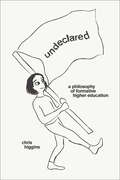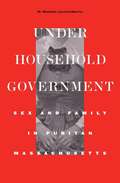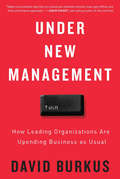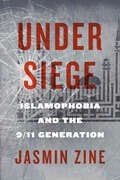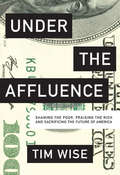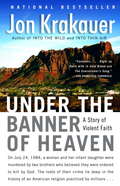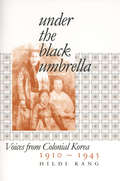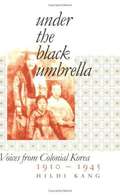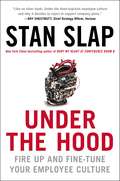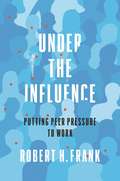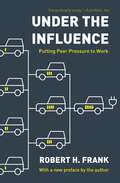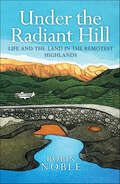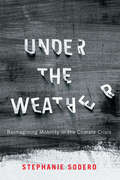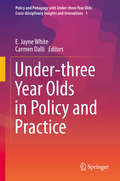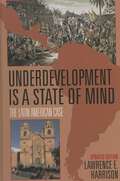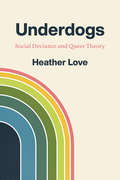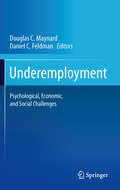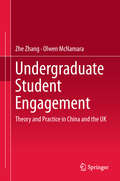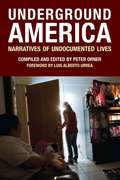- Table View
- List View
Undeclared: A Philosophy of Formative Higher Education
by Chris HigginsAn imaginative tour of the contemporary university as it could be: a place to discover self-knowledge, meaning, and purpose.What if college were not just a means of acquiring credentials, but a place to pursue our formation as whole persons striving to lead lives of meaning and purpose? In Undeclared, Chris Higgins confronts the contemporary university in a bid to reclaim a formative mission for higher education. In a series of searching essays and pointed interludes, Higgins challenges us to acknowledge how far our practices have drifted from our ideals, asking: What would it look like to build a college from the ground up to support self-discovery and personal integration? What does it mean to be a public university, and are there any left? How can the humanities help the job-ified university begin to take vocation seriously?Cutting through the underbrush of received ideas, Higgins follows the insight where it leads, clearing a path from the corporate multiversity to the renaissance in higher education that was Black Mountain College and back again. Along the way, we tour a campus bent on becoming a shopping mall, accompany John Dewey through a midlife crisis, and witness the first "happening.&” Through diverse and grounded philosophical engagements, Undeclared assembles the resources to expand the contemporary educational imagination.
Under Household Government
by M. Michelle Jarrett MorrisThe Puritans were not as busy policing their neighbors’ behavior as Nathaniel Hawthorne or many early American historians would have us believe. Keeping their own households in line occupied too much of their time. Under Household Government reveals that family members took on the role of watchdogs in matters of sexual indiscretion.
Under New Management: How Leading Organizations Are Upending Business as Usual
by David BurkusA provocative work that challenges the traditional and widely accepted principles of business management -- and proves that they are outdated, outmoded, or simply don't work Do open floor plans really work? Are there companies that put their employees' welfare first, and their clients second? Are annual performance reviews necessary? Dr. David Burkus is a highly regarded and increasingly influential business school professor who challenges many of the established principles of business management. Drawing on decades of research, Burkus has found that not only are many of our fundamental management practices wrong and misguided, but they can be downright counterproductive. These days, the best companies are breaking the old rules. At some companies, e-mail is now restricted to certain hours, so that employees can work without distraction. Netflix no longer has a standard vacation policy of two to three weeks, but instructs employees to take time off when they feel they need it. And at Valve Software, there are no managers; the employees govern themselves. The revolutionary insights Burkus reveals here will convince companies to leave behind decades-old management practices and implement new ways to enhance productivity and morale.
Under New Public Management
by Dorothy E. Smith Alison I. GriffithThe institutional ethnographies collected in Under New Public Management explore how new managerial governance practices coordinate the work of people doing front-line work in public sectors such as health, education, social services, and international development, and people management in the private sector.In these fields, organizations have increasingly adopted private-sector management techniques, such as standardized and quantitative measures of performance and an obsession with cost reductions and efficiency. These practices of "new public management" are changing the ways in which front-line workers engage with their clients, students, or patients.Using research drawn from Canada, the United States, Australia, and Denmark, the contributors expose how standardized managerial requirements are created and applied, and how they affect the practicalities of working with people whose lives and experiences are complex and unique.
Under Siege: Islamophobia and the 9/11 Generation (Advancing Studies in Religion)
by Jasmin ZineThe 9/11 attacks in the United States, the subsequent global “war on terror,” and the proliferation of domestic security policies in Western nations have had a profound impact on the lives of young Muslims, whose identities and experiences have been shaped within and against these conditions. The millennial generation of Muslim youth has come of age in these turbulent times, dealing with the aftermath and backlash associated with these events.Under Siege explores the lives of Canadian Muslim youth belonging to the 9/11 generation as they navigate these fraught times of global war and terror. While many studies address contemporary manifestations of Islamophobia and anti-Muslim racism, few have focused on the toll this takes on Muslim communities, especially among younger generations. Based on in-depth interviews with more than 130 young people, youth workers, and community leaders, Jasmin Zine’s ethnographic study unpacks the dynamics of Islamophobia as a system of oppression and examines its impact on Canadian Muslim youth. Covering topics such as citizenship, identity and belonging, securitization, radicalization, campus culture in an age of empire, and subaltern Muslim counterpublics and resistance, Under Siege provides a unique and comprehensive examination of the complex realities of Muslim youth in a post-9/11 world.Twenty years after the 9/11 attacks, Zine reveals how the global war on terror and heightened anti-Muslim racism have affected a generation of Canadians who were socialized into a world where their faith and identity are under siege.
Under a Wing
by Reeve LindberghMemoir of Anne Morrow Lindbergh and Charles Lindbergh's family written by their youngest daughter.
Under the Affluence
by Tim Wise"Tim Wise is one of the great public moralists in America today. In his bracing new book, Under the Affluence, he brilliantly engages the roots and ramifications of radical inequality in our nation, carefully detailing the heartless war against the poor and the swooning addiction to the rich that exposes the moral sickness at the heart of our culture. Wise's stirring analysis of our predicament is more than a disinterested social scientific treatise; this book is a valiant call to arms against the vicious practices that undermine the best of the American ideals we claim to cherish. Under the Affluence is vintage Tim Wise: smart, sophisticated, conscientious, and righteously indignant at the betrayal of millions of citizens upon whose backs the American Dream rests. This searing testimony for the most vulnerable in our nation is also a courageous cry for justice that we must all heed."-Michael Eric Dyson, author of The Black Presidency: Barack Obama and the Politics of Race in AmericaTim Wise is one of America's most prolific public intellectuals. His critically acclaimed books, high-profile media interviews, and year-round speaking schedule have established him as an invaluable voice in any discussion on issues of race and multicultural democracy.In Under the Affluence, Wise discusses a related issue: economic inequality and the demonization of those in need. He reminds us that there was a time when the hardship of fellow Americans stirred feelings of sympathy, solidarity for struggling families, and support for policies and programs meant to alleviate poverty. Today, however, mainstream discourse blames people with low income for their own situation, and the notion of an intractable "culture of poverty" has pushed our country in an especially ugly direction.Tim Wise argues that far from any culture of poverty, it is the culture of predatory affluence that deserves the blame for America's simmering economic and social crises. He documents the increasing contempt for the nation's poor, and reveals the forces at work to create and perpetuate it. With clarity, passion and eloquence, he demonstrates how America's myth of personal entitlement based on merit is inextricably linked to pernicious racial bigotry, and he points the way to greater compassion, fairness, and economic justice.Tim Wise is the author of many books, including Dear White America and Colorblind.nite!"America 'under the affluence' is a cruel and heartless place. By word and by deed, we turn against the poor and feast on a diet of resentment and myths. If anyone can unpack the racist and patriarchal lies that undergird our current culture of cruelty, Tim Wise can. In clear, simple language, product of a lifetime of research, he describes how we got here and how we might build a more compassionate place. We need his voice."-Laura Flanders, host of GritTV with Laura Flanders
Under the Banner of Heaven: A Story of Violent Faith
by Jon KrakauerNATIONAL BESTSELLER • From the author of Into the Wild and Into Thin Air, this extraordinary work of investigative journalism takes readers inside America&’s isolated Mormon Fundamentalist communities. • Now an acclaimed FX limited series streaming on HULU.&“Fantastic.... Right up there with In Cold Blood and The Executioner&’s Song.&” —San Francisco ChronicleDefying both civil authorities and the Mormon establishment in Salt Lake City, the renegade leaders of these Taliban-like theocracies are zealots who answer only to God; some 40,000 people still practice polygamy in these communities. At the core of Krakauer&’s book are brothers Ron and Dan Lafferty, who insist they received a commandment from God to kill a blameless woman and her baby girl. Beginning with a meticulously researched account of this appalling double murder, Krakauer constructs a multi-layered, bone-chilling narrative of messianic delusion, polygamy, savage violence, and unyielding faith. Along the way he uncovers a shadowy offshoot of America&’s fastest growing religion, and raises provocative questions about the nature of religious belief.
Under the Black Umbrella
by Hildi KangIn the rich and varied life stories in Under the Black Umbrella, elderly Koreans recall incidents that illustrate the complexities of Korea during the colonial period. Hildi Kang here reinvigorates a period of Korean history long shrouded in the silence of those who endured under the "black umbrella" of Japanese colonial rule. Existing descriptions of the colonial period tend to focus on extremes: imperial repression and national resistance, Japanese subjugation and Korean suffering, Korean backwardness and Japanese progress. "Most people," Kang says, "have read or heard only the horror stories which, although true, tell only a small segment of colonial life. "The varied accounts in Under the Black Umbrella reveal a truth that is both more ambiguous and more human the small-scale, mundane realities of life in colonial Korea. Accessible and attractive narratives, linked by brief historical overviews, provide a large and fully textured view of Korea under Japanese rule. Looking past racial hatred and repression, Kang reveals small acts of resistance carried out by Koreans, as well as gestures of fairness by Japanese colonizers. Impressive for the history it recovers and preserves, Under the Black Umbrella is a candid, human account of a complicated time in a contested place.
Under the Black Umbrella: Voices from Colonial Korea, 1910-1945
by Hildi KangIn the rich and varied life stories in Under the Black Umbrella, elderly Koreans recall incidents that illustrate the complexities of Korea during the colonial period. Hildi Kang here reinvigorates a period of Korean history long shrouded in the silence of those who endured under the "black umbrella" of Japanese colonial rule. Existing descriptions of the colonial period tend to focus on extremes: imperial repression and national resistance, Japanese subjugation and Korean suffering, Korean backwardness and Japanese progress. "Most people," Kang says, "have read or heard only the horror stories which, although true, tell only a small segment of colonial life. "The varied accounts in Under the Black Umbrella reveal a truth that is both more ambiguous and more human the small-scale, mundane realities of life in colonial Korea. Accessible and attractive narratives, linked by brief historical overviews, provide a large and fully textured view of Korea under Japanese rule. Looking past racial hatred and repression, Kang reveals small acts of resistance carried out by Koreans, as well as gestures of fairness by Japanese colonizers. Impressive for the history it recovers and preserves, Under the Black Umbrella is a candid, human account of a complicated time in a contested place.
Under the Cover: The Creation, Production, and Reception of a Novel
by Clayton ChildressUnder the Cover follows the life trajectory of a single work of fiction from its initial inspiration to its reception by reviewers and readers. The subject is Jarrettsville, a historical novel by Cornelia Nixon, which was published in 2009 and based on an actual murder committed by an ancestor of Nixon's in the postbellum South.Clayton Childress takes you behind the scenes to examine how Jarrettsville was shepherded across three interdependent fields—authoring, publishing, and reading—and how it was transformed by its journey. Along the way, he covers all aspects of the life of a book, including the author's creative process, the role of the literary agent, how editors decide which books to acquire, how publishers build lists and distinguish themselves from other publishers, how they sell a book to stores and publicize it, and how authors choose their next projects. Childress looks at how books get selected for the front tables in bookstores, why reviewers and readers can draw such different meanings from the same novel, and how book groups across the country make sense of a novel and what it means to them.Drawing on original survey data, in-depth interviews, and groundbreaking ethnographic fieldwork, Under the Cover reveals how decisions are made, inequalities are reproduced, and novels are built to travel in the creation, production, and consumption of culture.
Under the Hood
by Stan SlapYou can't sell it outside if you can't sell it insideYou want maximum business performance? Look under the hood and you'll find your employee culture: it is the power that drives the enterprise engine. To harness that rumbling power you've got to solve the mystery of what an employee culture actually is, how it operates and how to move it forward. These are the keys that this book will put right in your hands.Renowned business culture expert Stan Slap knows the difference between understanding your employees and understanding your employee culture. The distinction isn't semantics; it's the key to whether your strategies will succeed or fail. This myth-busting book reveals why an employee culture is an independent organism with its own rules, beliefs, and motivations--and the power to make or break any management plan (and any manager right along with it).Slap shows you how to get whatever you want from your employee culture, whether it's improved accountability, innovation, flexibility, resilience, energy, loyalty, or trust. Along the way he solves mysteries that have puzzled managers since the first Mesopotamian farmer hired some help, including:Why does an employee culture really resist change?What does it care about more than money?Why does it respond to leadership differently than to management?How does it talk to itself, and what does it mean when it won't talk to you?Why are company values the most dangerous threat to gaining its trust?If you have a wonderful employee culture, this book will help you scale it. If you have a troubled employee culture, this book will help you fix it. If you have an employee culture under pressure, this book will help you ease it. If you have a new employee culture, this book will help you shape it. And if you are investing in a company, this book will help you protect your greatest purchasable asset.Under the Hood is informed by immaculate research, including surveys of more than 15,000 employees from companies the world over. It's packed with original tactics that have driven performance for many organizations and countless managers. And it includes jaw-dropping inside stories of employee cultures from the likes of Samsung, Oracle, Progressive, CNN during wartime, Paul McCartney's band, and the Super Bowl film crew.It's all delivered in classic Stan Slap style: profound and provocative, heartfelt and often hysterical. This is not simply a management book; it is the business case for humanity. Management advice doesn't get realer or more important than this.
Under the Influence: Putting Peer Pressure to Work
by Robert H. FrankFrom New York Times bestselling author and economics columnist Robert Frank, bold new ideas for creating environments that promise a brighter futurePsychologists have long understood that social environments profoundly shape our behavior, sometimes for the better, often for the worse. But social influence is a two-way street—our environments are themselves products of our behavior. Under the Influence explains how to unlock the latent power of social context. It reveals how our environments encourage smoking, bullying, tax cheating, sexual predation, problem drinking, and wasteful energy use. We are building bigger houses, driving heavier cars, and engaging in a host of other activities that threaten the planet—mainly because that's what friends and neighbors do.In the wake of the hottest years on record, only robust measures to curb greenhouse gases promise relief from more frequent and intense storms, droughts, flooding, wildfires, and famines. Robert Frank describes how the strongest predictor of our willingness to support climate-friendly policies, install solar panels, or buy an electric car is the number of people we know who have already done so. In the face of stakes that could not be higher, the book explains how we could redirect trillions of dollars annually in support of carbon-free energy sources, all without requiring painful sacrifices from anyone.Most of us would agree that we need to take responsibility for our own choices, but with more supportive social environments, each of us is more likely to make choices that benefit everyone. Under the Influence shows how.
Under the Influence: Putting Peer Pressure to Work
by Robert H. FrankFrom New York Times bestselling author and economics columnist Robert Frank, bold new ideas for creating environments that promise a brighter futurePsychologists have long understood that social environments profoundly shape our behavior, sometimes for the better, often for the worse. But social influence is a two-way street—our environments are themselves products of our behavior. Under the Influence explains how to unlock the latent power of social context. It reveals how our environments encourage smoking, bullying, tax cheating, sexual predation, problem drinking, and wasteful energy use. We are building bigger houses, driving heavier cars, and engaging in a host of other activities that threaten the planet—mainly because that's what friends and neighbors do.In the wake of the hottest years on record, only robust measures to curb greenhouse gases promise relief from more frequent and intense storms, droughts, flooding, wildfires, and famines. Robert Frank describes how the strongest predictor of our willingness to support climate-friendly policies, install solar panels, or buy an electric car is the number of people we know who have already done so. In the face of stakes that could not be higher, the book explains how we could redirect trillions of dollars annually in support of carbon-free energy sources, all without requiring painful sacrifices from anyone.Most of us would agree that we need to take responsibility for our own choices, but with more supportive social environments, each of us is more likely to make choices that benefit everyone. Under the Influence shows how.
Under the Radiant Hill: Life and the Land in the Remotest Highlands
by Robin NobleThe northern parish of Assynt boasts some of the most spectacular scenery in Britain. The mountains of Quinag and Suilven dominate a very varied landscape with wild, white hills inland and a complex, intricate moorland to the west. Here, rocky crags, boggy flows, innumerable lochs and burns, stretch to a coast of equal variety with long fjords, high cliffs and sandy beaches. Close to many of the crofting townships are dense areas of native woodland. In this book, Robin Noble, who has been intimately involved with this corner of the north-west Highlands of Scotland his whole life, celebrates its rugged beauty and shares many intimate encounters with the resident wildlife – including, golden eagles, otters, badgers and pine martens – which surrounded his cottage in its wooded glen under the ‘long mountain’ of Quinag. Assynt is also well known for its important role in the history of community land ownership, and Robin describes too his deep involvement with those who live there. He learned much from the old generation of shepherds and crofters whom he got to know in the 1960s, as well as from their children and incomers in later decades, and shared with them the challenges of living in a remote, fragile community.
Under the Tarnished Dome: How Notre Dame Betrayed its Ideals for Football Glory
by Don Yeager Douglas S. LooneyThe story of the University of Notre Dame football team and its years under Coach Lou Holtz.
Under the Weather: Reimagining Mobility in the Climate Crisis (McGill-Queen's/Brian Mulroney Institute of Government Studies in Leadership, Public Policy, and Governance)
by Stephanie SoderoHumans and human mobility, including driving and flying, are entangled with the climate emergency. Fossil-fuelled mobility worsens severe weather, and in turn, severe weather disrupts human mobility. A shift to zero-emission vehicles is critical but insufficient to repair the damage or prepare communities for the coming disruptions severe weather will bring. In Under the Weather Stephanie Sodero explores the intersection between human mobility and severe weather. Anchored in two Atlantic Canadian hurricane case studies, Hurricane Juan in Mi'kma'ki/Nova Scotia in 2003 and Hurricane Igor in Ktaqmkuk/Newfoundland in 2010, the book contributes to contemporary cultural and policy discussions by offering five practical recommendations – revolutionize mobility, prioritize vital mobility of medical goods and services, embrace ecological mobilities, rebrand redundancy, and think flexibly – for how mobility can be reimagined to work with, rather than against, the climate in ways that also benefit the health, education, and economy of local communities. This ecological approach to mobilities sheds light on extreme mobility dependency and the impact of mobility disruptions on the ground in Canadian communities.Focusing on the entangled relationship between human mobility and the climate, Under the Weather examines how communities can transform their relationship with mobility to enable greater resilience.
Under-three Year Olds in Policy and Practice (Policy and Pedagogy with Under-three Year Olds: Cross-disciplinary Insights and Innovations)
by Carmen Dalli E. Jayne WhiteThe first book in the series Policy and Pedagogy with Under-three year olds: Cross Disciplinary insights and innovations establishes a path for the much-needed examination of the experiences of infants and toddlers in contemporary educational settings across the globe. Bringing together internationally renowned scholars in the field, it starts a series of discussions about the positioning of under-three year olds in contemporary practice and policy contexts. It takes an in-depth look at what this means for our understanding of under-three year olds and those who share their worlds. Featuring some of the most important contemporary topics in this pedagogical domain, such as care, well-being, belonging, professionalism and status, the contributors offer a kaleidoscope of perspectives for contemplating the new normality of very young children living their lives in group-based early childhood settings, and what gives rise to their current realities. It also explores some important policy directions and trends.
Underdevelopment Is a State of Mind: The Latin American Case
by Lawrence E. HarrisonOriginally published in 1985, Underdevelopment Is a State of Mind_ was one of the first studies to examine Latin America's rocky development as cultural, rather than colonial, byproduct.
Underdogs: Social Deviance and Queer Theory
by Heather LoveA pathbreaking genealogy of queer theory that traces its roots to an unexpected source: sociological research on marginal communities in the era before Stonewall. The sociology of “social deviants” flourished in the United States at midcentury, studying the lives of outsiders such as homosexuals, Jews, disabled people, drug addicts, and political radicals. But in the following decades, many of these downcast figures would become the architects of new social movements, activists in revolt against institutions, the state, and social constraint. As queer theory gained prominence as a subfield of the humanities in the late 1980s, it seemed to inherit these radical, activist impulses—challenging not only gender and sexual norms, but also the nature of society itself. With Underdogs, Heather Love shows that queer theorists inherited as much from sociologists as they did from activists. Through theoretical and archival work, Love traces the connection between midcentury studies of deviance and the antinormative, antiessentialist field of queer theory. While sociologists saw deviance as an inevitable fact of social life, queer theorists embraced it as a rallying cry. A robust interdisciplinary history of the field, Underdogs stages a reencounter with the practices and communities that underwrite radical queer thought.
Underdogs: Social Deviance and Queer Theory
by Heather LoveA pathbreaking genealogy of queer theory that traces its roots to an unexpected source: sociological research on marginal communities in the era before Stonewall. The sociology of “social deviants” flourished in the United States at midcentury, studying the lives of outsiders such as homosexuals, Jews, disabled people, drug addicts, and political radicals. But in the following decades, many of these downcast figures would become the architects of new social movements, activists in revolt against institutions, the state, and social constraint. As queer theory gained prominence as a subfield of the humanities in the late 1980s, it seemed to inherit these radical, activist impulses—challenging not only gender and sexual norms, but also the nature of society itself. With Underdogs, Heather Love shows that queer theorists inherited as much from sociologists as they did from activists. Through theoretical and archival work, Love traces the connection between midcentury studies of deviance and the antinormative, antiessentialist field of queer theory. While sociologists saw deviance as an inevitable fact of social life, queer theorists embraced it as a rallying cry. A robust interdisciplinary history of the field, Underdogs stages a reencounter with the practices and communities that underwrite radical queer thought.
Underdogs: Social Deviance and Queer Theory
by Heather LoveA pathbreaking genealogy of queer theory that traces its roots to an unexpected source: sociological research on marginal communities in the era before Stonewall. The sociology of “social deviants” flourished in the United States at midcentury, studying the lives of outsiders such as homosexuals, Jews, disabled people, drug addicts, and political radicals. But in the following decades, many of these downcast figures would become the architects of new social movements, activists in revolt against institutions, the state, and social constraint. As queer theory gained prominence as a subfield of the humanities in the late 1980s, it seemed to inherit these radical, activist impulses—challenging not only gender and sexual norms, but also the nature of society itself. With Underdogs, Heather Love shows that queer theorists inherited as much from sociologists as they did from activists. Through theoretical and archival work, Love traces the connection between midcentury studies of deviance and the antinormative, antiessentialist field of queer theory. While sociologists saw deviance as an inevitable fact of social life, queer theorists embraced it as a rallying cry. A robust interdisciplinary history of the field, Underdogs stages a reencounter with the practices and communities that underwrite radical queer thought.
Underemployment
by Daniel C. Feldman Douglas C. MaynardUnderemployment - when people are employed in some way that is insufficient, such as being overqualified or working part-time when one desires full-time employment - is a challenge faced by all industrialized nations and their organizations and individuals. Just like unemployment, some level of underemployment exists even in the best of times, but it becomes more pervasive when the job market is weak. Given the current economic climate in North America and abroad, researchers and scholars in various disciplines (psychology, business, sociology, economics) are becoming more interested in investigating the effects of underemployment and identifying possible practical solutions. Underemployment synthesizes the current understanding of the phenomenon by bringing together scholars with diverse perspectives and expertise with the aim of informing and guiding the next generation of underemployment research.
Undergraduate Student Engagement: Theory and Practice in China and the UK
by Zhe Zhang Olwen McNamaraThis book focuses on undergraduate student engagement in China and the UK. It offers an innovative perspective on this aspect, which, although pervasive, is not always acknowledged by its users to be complex and multidimensional in nature, firmly rooted in cultural, social and disciplinary norms, and difficult to measure. Competition within the global higher education market has become increasingly intense amongst universities; and the higher education sector in China, currently the largest source of international students, is beginning to compete strongly for its home market. Against this consumerist background, student engagement, with its close relation to positive learning outcomes, is increasingly receiving attention from higher education managers and researchers who seek to improve the quality of their ‘products’.The research study on which the book is based draws on three courses, two in China and one in the UK. It offers a binary perspective across two very different cultures (Western and Confucian) and two very different subject areas (Chinese language and mathematics). The study employs a mixed-methods design and develops a conceptual framework derived from statistical and thematic analysis. An original theoretical lens, combining a bioecological perspective (Bronfenbrenner) and a sociocultural one (Holland et al.’s Figured Worlds), adds further interpretive power to help understand the construct of student engagement.
Underground America: Narratives of Undocumented Lives
by Peter OrnerUnderground America tells the stories of men and women who have come to the United States seeking a better life for their families, only to be subjected to dehumanizing working conditions.
